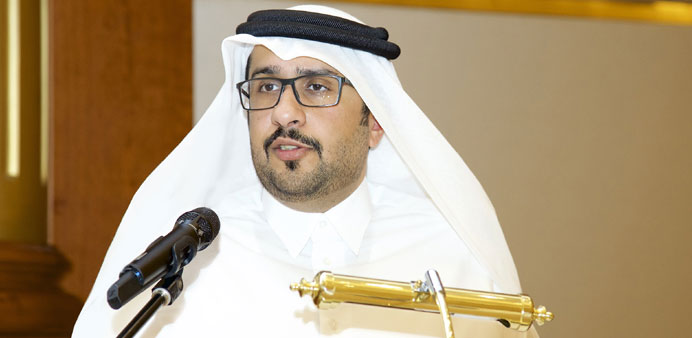Hassan Abdulrahman al-Ibrahim speaking at the World Export Development Forum 2015 yesterday.
By Joey Aguilar/Staff Reporter
The economic impact of the tourism sector in Qatar is ‘becoming increasingly visible,’ Qatar Tourism Authority’s (QTA) chief tourism development officer Hassan Abdulrahman al-Ibrahim has said.
Speaking at the World Export Development Forum 2015 during the “Spotlight on Tourism” session yesterday, he noted that Qatar welcomed more than 5mn international visitors since the launching of the ‘National Tourism
Sector Strategy’ last year.
According to al-Ibrahim, the country is also on track to achieve the 3mn annual visitors by the end of this year, which represents an average annual growth of 14% between 2009 and 2014.
“This makes Qatar one of the world’s fastest growing
destinations,” he said.
“In 2013 alone, the tourism sector directly contributed QR13.6bn to the country’s Gross Domestic Product. This represents 4% of the non-extraction economy, which provides close to 70,000 jobs in Qatar.”
With the support of public and private sector partners, al-Ibrahim said tens of millions of dollars have been invested in upgrading and developing the needed infrastructure to support the expansion of the
tourism sector.
“The majority of delegates will have arrived in Qatar via one such investment – the state-of-the-art Hamad International Airport,” he added.
QTA’s long-term strategy is to increase tourism’s total contribution to Qatar’s total economy to 5.1%, and up to 9.7% of the country’s non-hydro-carbon economy by 2030.
“In a country heavily reliant on its natural resources and hydrocarbon wealth, tourism is playing a growing role in diversifying Qatar’s economy, in turn shielding it from the oil market fluctuations, which can impact growth and sustainability,” al-Ibrahim pointed out.
He added that the National Tourism Sector Strategy focuses more in developing public-private partnerships and attracting investments into the sector, which are crucial to diversifying Qatar’s tourism offering.
QTA has worked with its partners at Qatar Development Bank and Qatar Business Incubation Center to develop an initiative that will support start-ups and scale-ups in the tourism sector.
Al-Ibrahim also announced that entrepreneurs will soon have access to a specialised tourism business incubator that will enable them to develop products and services that enhance the overall Qatar tourism experience.
“Investors and entrepreneurs who get involved in growing the sector now stand to benefit from a rare competitive edge and become partners in the journey to build and promote Qatar’s global destination brand in line with local values and traditions,”
he said.
He added that such initiatives help produce what he described as a “mature and sustainable tourism sector, which in turn, diversifies the economy and helps to reduce Qatar’s dependence on its hydrocarbon resources.”
“Not only for economic reasons - but because developing home grown tourism products and services is one of the ways we can showcase our culture and heritage to the world,” he said.
Launched last year, al-Ibrahim noted that the National Tourism Sector Strategy identified four key areas of development: Urban, Business, Cultural and Sports Tourism.
QTA and its partners are intensifying their efforts to provide visitors with the chance to embark on authentic experiences of the Qatari and Arab culture through awe-inspiring historical and heritage sites. These also include a compelling line-up of museums and contemporary art galleries.
He said they offer exceptional urban experiences of a bustling city through entertainment, shopping, dining and relaxation opportunities for families and individuals.
Besides expanding its portfolio of year-round expos, shows, conferences and business events, Qatar now hosts numerous international events held in first-class exhibition and
conference venues.
“The country is carving for itself a place on the global map as a premium destination for business events,” The QTA official said. “Qatar’s leadership recognises that tourism holds the potential to become one of the country’s main avenues in developing a sustainable, non-hydrocarbon economy.”

